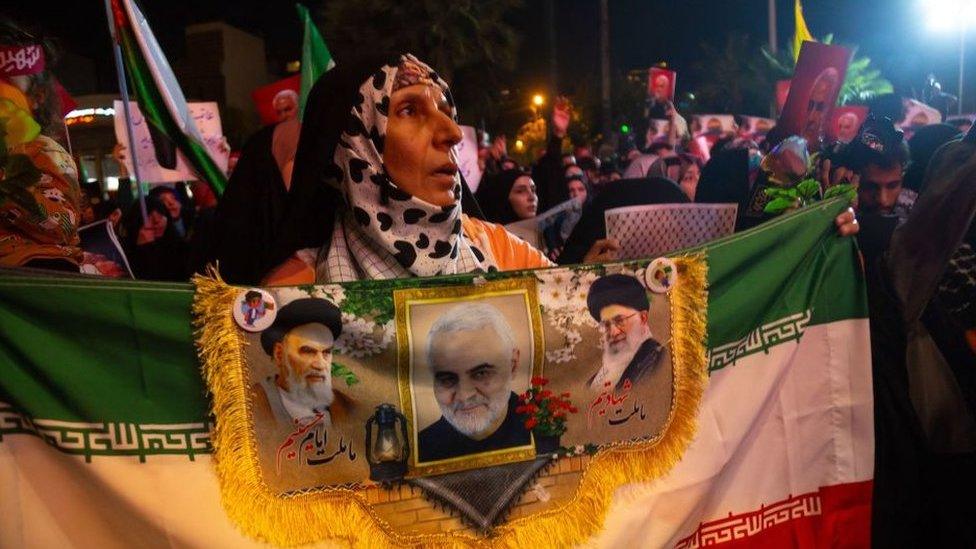US $6bn deal with Iran under scrutiny in wake of Hamas attack on Israel
- Published

An Iranian pro-government protester in Tehran joins a celebration of the Hamas attack on Israel
The US says Iran has not accessed money agreed in a prisoner swap as the White House faces renewed criticism over the deal amid claims Tehran instigated a Hamas attack on Israel last weekend.
Washington has a "quiet understanding" with go-between Qatar not to free up any of $6bn (£.4.9bn) from the pact, the BBC's US partner CBS reports.
Iran's mission to the UN said the US cannot renege on the agreement.
The US has said it has no evidence of a direct Iran link to the Hamas assault.
The $6bn of Iranian oil funds held in South Korea were unfrozen in September as part of a deal that saw five US-Iranian citizens freed from captivity.
US President Joe Biden's officials have pushed back strongly against Republican criticism that the fund empowered Iran's support for Hamas.
On Thursday morning, Deputy US Treasury Secretary Wally Adeyemo told House of Representatives Democrats behind closed doors that the money "isn't going anywhere anytime soon".
But later in the day, White House spokesman John Kirby would not confirm reports that the funds had been frozen.
"What I can tell you," he said, "is none of it has been accessed and we are watching every dime as you would expect.
"We were watching it very, very closely."

More on Israel Gaza war
Follow live: Latest updates
Hostages: Who are the people taken from Israel?
Bowen: Inside Israeli border village where Hamas killed families in their homes
Watch: Hiding at home, blinded and choked by dust - life in Gaza
History behind the story: The Israel-Palestinian conflict

Neither would US Secretary of State Anthony Blinken confirm the money had been frozen as he visited Tel Aviv on Thursday.
He instead listed the "facts" about the account in a weary voice when asked about the matter by journalists.
America's top diplomat said it was Iran's money from oil sales, that it was held in Qatar and that it was only for food and medicine and that the US has to approve every transaction.
It is a complicated mechanism that has not yet been activated.
Any such freeze would be a provocative one at a time when the US is trying to prevent Iran and the militant groups it backs from joining the Israel-Hamas conflict.
Watch: 'Gunshots everywhere,' Israel music festival survivor tells Blinken
Analysts warn such a move could embolden hardliners in Iran.
US officials would also probably be concerned a freeze of the fund would lead Iran to arrest more US-Iranian citizens.
National Security Adviser Jake Sullivan told reporters on Wednesday that Iran had played a role in the attack by funding the military wing of Hamas over the years.
But US officials have also said they cannot corroborate reports of direct involvement in the attack by Iran, which is Israel's arch-enemy.
President Biden has been under pressure from within his party to stop the funds going to Iran.
Democratic senators who are facing re-election next year have joined Republican calls for the US president to effectively break the deal.
But Iran's mission to the United Nations said in a statement reported by the Washington Post: "The senators in question and the US government are all acutely aware that they can NOT renege on the agreement.
"The money rightfully belongs to the people of Iran, earmarked for the Government of the Islamic Republic of Iran to facilitate the acquisition of all essential and non-sanctioned requisites for the Iranians."